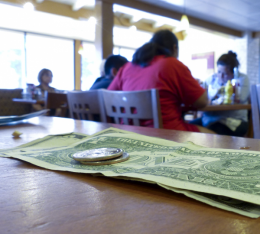Black History Month Blues: The Tipping Point
Posted By Spencer J. Quinn On In North American New Right | Comments Disabled 2,160 words
2,160 words
Conservative blogger Kim du Toit had a revealing post earlier this month entitled “Blacktops.” [1] In his words:
Anyone who’s ever worked in the restaurant business will know exactly what the title of this post means. Basically, it’s a denigrating [sic] term that waiters (of all races, by the way) use as shorthand to describe a table of Black customers. What “blacktop” means is that the servers are highly unlikely to get a tip from that seating. Black people don’t tip. (As always, that may not be 100% accurate but, as the bookies say, it’s the way to bet.)
As someone with much experience in the restaurant business, I have to second Kim’s analysis. He is absolutely correct. (Read the rest of his blog post for a good rundown of his tipping experiences as an Uber driver.) Blacks in all but the highest-scale restaurants have a well-earned reputation for not tipping. Even to say they’re prone to under-tipping would be giving them too much credit. Nearly all of the servers I have worked with (regardless of race) have said the same thing: When a black dinner party appears, you will most likely receive nothing for your efforts. Furthermore, there is an excellent chance that they will make you run.
What do I mean by this? Here is a case-in-point to explain. Over twenty years ago, I waited tables at a middling-quality barbecue joint just south of the Mason-Dixon Line. The clientele was approximately half-black and half-white, with the vast majority of the customers falling into the lower strata of the middle class. A co-worker of mine — an older guy who was in school for social work — was given a table of around ten blacks during the dinner rush. The rest of us knew what he was in for and sympathized. We promised to help if we could, but it was a busy night, so there was only so much we could do. Anyway, they ran his ass off for over an hour.
Get this. Get that. This ain’t right. Send this back. I changed my mind. No, I don’t want that, I want this. No, I said this, not that.
 [2]
[2]You can buy Spencer Quinn’s novel White Like You here [3]
It was tough to watch. They were quite loud. They drank a lot of alcohol. They stayed for a long time after they had finished eating. They also asked for a free birthday cake — every large black dinner party back then, it seemed, asked for that free birthday cake — and this required the entire wait staff to sing “Happy Birthday” to some kid who was probably not turning ten that evening. And when it was finally done, the sweaty, out-of-breath waiter got completely stiffed. Adding insult to injury, there was a tremendous amount of cleanup afterward — on the table, under the table, and around it. Between the zero percent tip, the other tables in his section that had to be dedicated to making this one big table, and the sweet time these people took eating, drinking, chatting, and bossing our poor waiter around, he went home that night with maybe a third of what he could have.
So, yes. Waiters, beware the black customer.
To this peculiar phenomenon, I have something fairly unique to offer. As a waiter at that very same restaurant, I can proudly say that I was never — not once, not ever — stiffed by blacks. I worked there for two years, and in those two years I became the world champion of waiting on black people. You can cue the Rocky music. In fact, I feel like pounding my chest right now and spouting a loud Muhammad Ali boast: Not only was I the greatest, I was the greatest of all time. I can confidently assert that no human being in the history of human beings was ever as good at wheedling miniscule tips out of black diners as I was.
My co-workers never understood it. They tried to emulate my technique, but always botched it somehow. It got so bad that after a while, I became the go-to guy whenever a large party of blacks invaded the restaurant — which happened often. While this made me more popular with my co-workers, it invariably resulted in less money landing in my pocket at the end of the night. Not being a particularly materialistic person, I never really minded this. When it came down to it, I never really minded waiting on black people, either. Liberal, race-denying idiot that I was back then, I never failed to rise (or, really, descend) to the occasion.
My secret was basically threefold. First, back then I suffered from a debilitating and potentially lethal psychiatric condition colloquially known as “negrophilia.” I was a recent product of the Left-wing university system, I was well-versed on the topic of black grievance, and I was still several years away from my great race awakening. I basically sympathized with blacks as a supposedly oppressed and marginalized minority and was enthusiastic about doing what I could to make their lives even a little better. Boy, did it ever feel good to do good. So, while most waiters would look at an eight-top of blacks as bad luck, I would see it as an opportunity — an opportunity to stroke my precious negrophilia.
 [4]
[4]You can buy Greg Johnson’s The White Nationalist Manifesto here [5]
Second, I abandoned all dignity when I waited on black people. With any honest employment, no matter how humble, there is and should be a concomitant sense of dignity. We all should hold a certain amount of respect for people who hold down jobs and do good work for its own sake and not merely for the sake of grabbing a paycheck. These are good, honest, hard-working people, without whom no nation could survive for long. So when a waiter deals with customers who take advantage of them, their dignity becomes threatened. To be miffed as a result of such abuse is a perfectly natural and healthy response. This was how all of my co-workers dealt with the issue of black dinner parties — they got miffed. They could hide it all night behind a smile and a pleasant attitude, but it was there. It was always there.
And let me tell you: black people have spider-sense for this sort of thing. If you, as a waiter, chafe even the tiniest bit under your crumbling dignity in their presence, they will know it, they will resent it, and they will mercilessly run you.
So if one’s dignity is an Achilles’ heel when dealing with black diners, then one must dispense with one’s dignity if one wishes to deal successfully with them. That’s exactly what I did. Out the window went my dignity whenever a party of six blacks showed up expecting a dinner of fried chicken, baby-back ribs, and Brunswick stew. I was there to serve them, and it was my privilege to do so. They didn’t have to run me because I ran me. And nobody ran faster. No request was too petty, no request was too superfluous, and no request was ever forgotten. Because of this, our black clientele grew to like me. When they came back, they would ask for me. They would even try to get to know me a little. In fact, a black diner once took me aside and said, “Son, you need to calm down. I don’t mind waiting a couple minutes for my slaw, now. It’s all right.” Everybody at the table laughed, and so did I.
Well, it was funny at the time.
The final element of my secret to squeezing tips out of black people was very simple: extra butter and extra sour cream. I learned early on that any black dinner party larger than a two-top will sooner or later ask for extra butter and extra sour cream. It was like Godwin’s Law, but with high-fat dairy products instead of Hitler. So, to nip this potential catastrophe in the bud, I endeavored to hand out copious amounts of butter and sour cream at every opportunity. They didn’t even have to ask. Bread, curly fries, baked potatoes, salad, sautéed veggies, rice pilaf, entrées. Didn’t matter. Whenever I gave them anything, I also gave them extra butter and extra sour cream.
Never once did they complain, and never once did I get stiffed.
Of course, I was consistently under-tipped by these people. Maybe they just couldn’t be bothered to calculate fifteen percent. I don’t know. I have a feeling that they considered any tip at all to be generous. They could run a check up to $147 after an hour and a half of dominating the dining room — so, clearly, they weren’t poor — and then leave me with three crumpled dollar bills and a smattering of pocket change. And to me at the time, this was the height of glory. Afterwards, my co-workers would gather ‘round my table and gawk at the untold riches displayed before them. No other waiter could do this. And I did it all the time.
I was a star.
 [6]
[6]You can buy Greg Johnson’s Truth, Justice, & a Nice White Country here [7]
Eventually, I wised up and moved on. I learned about dignity and I learned about race, and I have learned to put such foolish antics behind me. But one episode will never leave me. It was early in the evening. They were a three-top: two men and one woman. Older, but not elderly. And they were different. The men weren’t dressed as if they were about to enjoy a night out. They were dressed as if they had just come from their blue collar jobs. And the woman wore the simple, matronly dress of a housewife. I realized right away that these were country folk. Although this was technically the South, we were in a relatively urban area. Black country folk typically didn’t set foot in restaurants like this one. There simply weren’t that many of them around.
But in this case, they were around and they did set foot in that restaurant. They were perfectly nice and seemed to appreciate the effort I put into serving them. Not once did they run me. I was happy that they were clearly enjoying themselves. When it was over, their bill was a little over $50. But one of the men produced a coupon, bringing the total down to something like $38. With coupons, etiquette requires that the diner tip the waiter on the total price, not the discounted one. Of course, I doubted that these people were aware of that, and braced myself for the eight quarters and two dimes they were going to leave me.
Instead, however, I got something much better. The woman called to me. She said, “Baby…” (Back then, older black women always called me “baby” — don’t ask me why.) “I wanna give this to you.”
In her outstretched hand was a single dollar bill. She was presenting it to me as if it were some coveted award. And she meant it. Her wide, grandma smile and her sweet demeanor told me that she meant it. She really thought she was giving me something of value in return for my service. I was touched. In my five-year-long waiting career, I had seen many generous tips. But none were as remotely rewarding as this one. I don’t know why. Even today as a dedicated White Nationalist with scandalous opinions on race, I still get a little misty-eyed when recalling this event.
In retrospect, it also serves as a dose of reality. It underscores how fundamentally different blacks and whites are. In this instance, we have a complete lack of rancor and animosity. Nothing but good feelings all around, and still blacks are not able to ascribe the same high value to work and service as whites do. They just can’t help it. It makes me sad to think about sometimes, but the gulf between the races is real and must be addressed if we ever care to solve the racial problems plaguing our country today.
 [8]
[8]You Can buy F. Roger Devlin’s Sexual Utopia in Power here [9]
As a champion waiter, I was unknowingly behaving like the modern white elite: Thinking I could solve the problem of black people by lavishing on them everything they could ever desire, and being happy with getting very little in return. Sounds like today’s Democratic Party, doesn’t it? Despite its moderate success, this kind of relationship is by its nature unbalanced and can’t last. Eventually, I grew up and moved on. But whites as a race need to grow up and move on as well. We can’t keep indulging black people all the time like we do in our culture and in our politics. We can’t keep giving them things that they don’t earn for themselves. And, most importantly, we can’t keep short-changing ourselves. We have to remember that we are a great people, and we have done great things in the past, and are still doing great things today.
We are made for much better things than handing out extra butter and sour cream.
Spencer J. Quinn is a frequent contributor to Counter-Currents and the author of the novel White Like You [10].